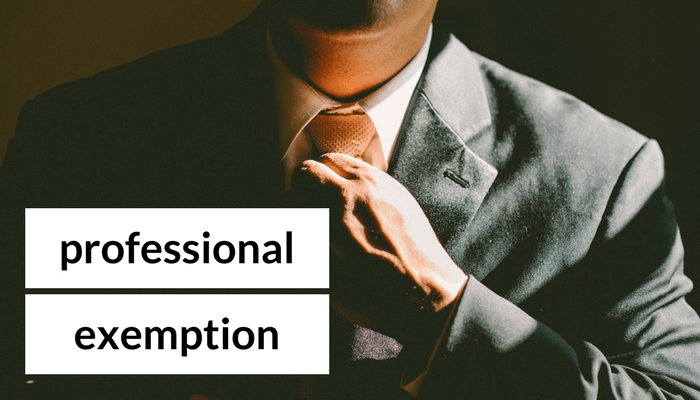Most New York employers are subject to both federal and state minimum wage and overtime requirements. In most cases, this means the employer must pay its employees at least the minimum wage for all hours worked and time-and-a-half for hours over 40 in a week. There are, however, many exceptions to these requirements. This post addresses the professional exemption under both the FLSA and New York law.
(Click here for A Quick Guide of the New York State and federal Administrative exemptions.)
(Click here for A Quick Guide of the New York State and federal Executive exemptions.)
FLSA Professional Exemption
Under the FLSA (the federal minimum wage/overtime law), employees may be exempt as a “professional” if:
- They are compensated on a salary or fee basis of at least $684 per week, and;
- Their primary duty is performing work that requires either:
- advanced knowledge in a field of science or learning customarily acquired by a prolonged course of specialized intellectual instruction (“learned professionals”), or
- invention, imagination, originality or talent in a recognized field of artistic or creative endeavor (“creative professionals”).
The FLSA has a further special exception for certain categories of professional employees. There is no salary requirement for attorneys, medical doctors, and teachers who are working in those capacities.
To qualify for the professional exemption under the FLSA, other employees would have to receive the applicable minimum salary. This includes engineers, architects, and artists, for example.
There is an additional potential FLSA exemption for certain computer employees. Employees performing jobs such as computer programming, software engineering, or systems analysis may be exempt even if they do not qualify for the professional exemption. The computer employee exemption also uniquely has an alternative hourly compensation threshold ($27.63 per hour) rather than only a salary threshold.
New York Professional Exemption
Under New York State law, employees can be exempt from minimum wage and overtime requirements if:
- Their primary duties consist of the performance of work that either:
- requires knowledge of an advanced type in a field of science or learning customarily acquired by a prolonged course of specialized intellectual instruction and study (as distinguished from general academic instruction, an apprenticeship, or training in routine mental, manual, or physical processes); or
- is original and creative in character in a recognized field of artistic endeavor (as opposed to work which could be produced by a person endowed with general manual or intellectual ability and training), and the result of which depends primarily on the invention, imagination or talent of the employee.
AND
2. The employee’s work either involves the consistent exercise of discretion and judgment or is predominately intellectual and varied in character and is of the nature that the work produced cannot be standardized in relation to a given period of time.
Unlike the FLSA, New York law does not have a salary or fee basis requirement for professional employees. However, since most employees are subject to both the FLSA and state law, professional employees other than doctors, lawyers, and teachers may need to receive a minimum salary in order to be fully exempt.
Summary
The professional exemptions only apply to certain employees in recognizable professional fields. Many other employees who probably consider themselves professionals will not qualify. However, such employees may be exempt under another exemption, such as the administrative or executive exemptions.
Of critical note, an employee does not automatically qualify for a professional exemption by having an advanced degree. Rather, the degree must qualify them in a professional field and they must be performing the type of work typical to that profession.
Likewise, though often a critical element, a professional degree is not always necessary for the professional exemption. Extensive experience in a professional field can establish the expertise necessary in some cases.
Read about the New York State and FLSA Administrative Exemptions here.
Read about the New York State and FLSA Executive Exemptions here.
